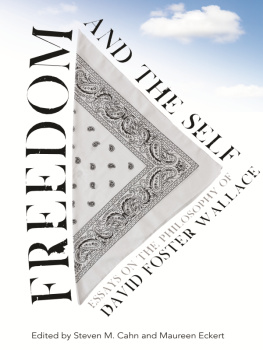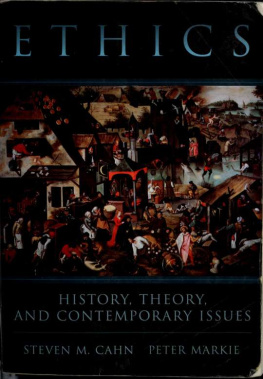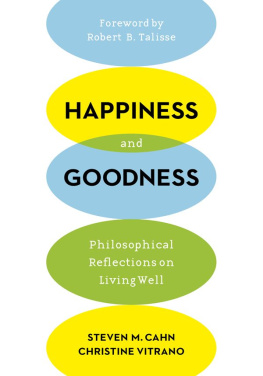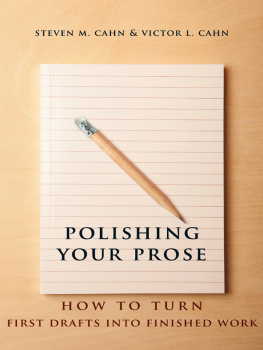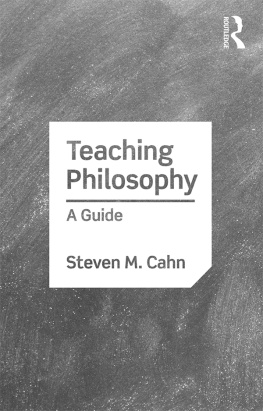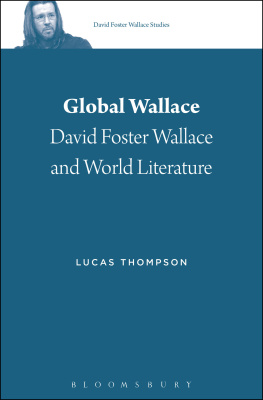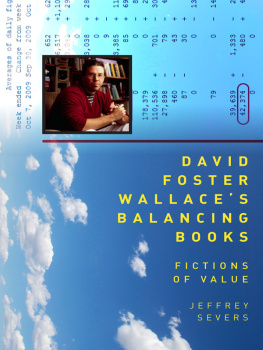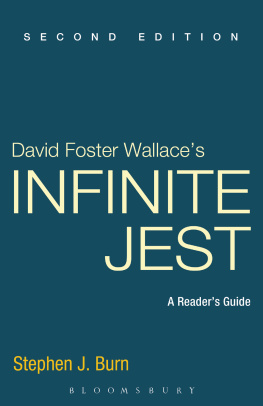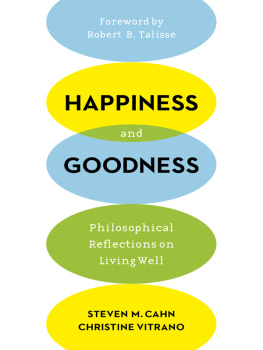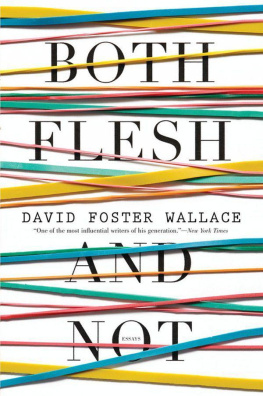FREEDOM AND THE SELF
FREEDOM
AND THE SELF
ESSAYS ON THE PHILOSOPHY OF
DAVID FOSTER WALLACE
Edited by Steven M. Cahn and Maureen Eckert
COLUMBIA UNIVERSITY PRESS NEW YORK
Columbia University Press
Publishers Since 1893
New York Chichester, West Sussex
cup.columbia.edu
Copyright 2015 Columbia University Press
All rights reserved
E-ISBN 978-0-231-53916-6
Library of Congress Cataloging-in-Publication Data
Freedom and the self : essays on the philosophy of David Foster Wallace / edited by Steven M. Cahn and Maureen Eckert.
Pages cm
Includes bibliographical references and index.
ISBN 978-0-231-16152-7 (cloth : alk. paper) ISBN 978-0-231-16153-4 (pbk. : alk. paper) ISBN 978-0-231-53916-6 (e-book)
1. Wallace, David Foster. 2. Fate and fatalism. 3. Taylor, Richard, 19192003. 4. Semantics. I. Cahn, Steven M., editor.
BJ1461.F77 2015
191dc23
2014035372
A Columbia University Press E-book.
CUP would be pleased to hear about your reading experience with this e-book at .
Cover images: Shutterstock
Cover design: Marc Cohen
References to websites (URLs) were accurate at the time of writing. Neither the author nor Columbia University Press is responsible for URLs that may have expired or changed since the manuscript was prepared.
CONTENTS
STEVEN M. CAHN AND MAUREEN ECKERT
WILLIAM HASKER
GILA SHER
M. ORESTE FIOCCO
MAUREEN ECKERT
DANIEL R. KELLY
NATHAN BALLANTYNE AND JUSTIN TOSI
STEVEN M. CAHN AND MAUREEN ECKERT
L ike Mary Ann (or Marian) Evans, better known as George Eliot, who translated Spinozas monumental Ethica, Ordine Geometrico Demonstrata, and T. S. Eliot, who was offered a faculty position in the Department of Philosophy at Harvard University, David Foster Wallace (19622008) was a major literary figure who also excelled in philosophy.
The son of the noted philosopher James D. Wallace, who taught at the University of Illinois at Urbana-Champaign, David Foster Wallace, like his father, was graduated from Amherst College, receiving a BA degree summa cum laude in 1985 with majors in both English and philosophy. His honors thesis in English was published two years later as his first novel, The Broom of the System; his honors thesis in philosophy, titled Richard Taylors Fatalism and the Semantics of Physical Modality was published in 2011 by Columbia University Press as the centerpiece of a collection we edited titled Fate, Time, and Language.
The preface to that book concluded with the hope that Wallaces arguments will be taken seriously and subjected to careful scrutiny. The original essays in this volume provide such assessments of Wallaces philosophical thought, whether in his monograph on fatalism or his other works.
Our first three contributors consider in detail Wallaces analysis of Richard Taylors controversial 1962 essay, Fatalism, in which Taylor maintains that, when suitably connected, six presuppositions widely accepted by contemporary philosophers imply the fatalistic conclusion that we have no more control over future events than we have now over past ones. (Taylors article and the spate of replies it engendered can be found in our Fate, Time, and Language.)
William Hasker considers the semantic system developed by Wallace to be a splendid achievement but doubts Wallaces claim to have demonstrated a new objection to Taylors reasoning. Hasker, however, also believes that a contemporary philosophy of time known as eternalism, which leaves no room in the world for alternative possibilities, poses a threat to freedom, thus suggesting the importance of continuing to explore the issues that concerned Taylor and Wallace.
Gila Sher admires the richness and inventiveness of Wallaces work and judges that it sets a new standard for a future defense of Taylors argument. She believes that Wallace anticipated ideas published almost two decades later by the philosopher of logic John McFarlane, who has argued that truth depends on a context of assessment.
M. Oreste Fiocco describes Wallaces discussion as sophisticated and important but claims that, like other critics of Taylor,
Wallace failed to appreciate that Taylors argument has the form of a reductio ad absurdum: assuming the truth of his opponents position, showing its unacceptable consequences, and thereby demonstrating its falsity. Whereas Wallace concluded by challenging Taylor to do metaphysics, not semantics, Fiocco responds that Taylor is offering a metaphysical argument that defends the existence of contingencies, possibilities never realized but integral to the world.
Maureen Eckert adapts Wallaces semantic System J to the issue of whether time travel is possible. Drawing additionally on the work of David Lewis, she seeks to offer an account of how any apparent contradictions in the concept of time travel can be avoided. She leaves open whether Wallace would have considered this feature of his system to be a bug or a positive implication.
Daniel R. Kelly asks whether Wallace was a fox or a hedgehog. Granted, he knew many things, but did his work also have a single overarching idea? Kelly finds such unity in Wallaces concern for the importance of free choice, a theme that runs throughout this collection.
Freedom requires genuine alternatives, not only in action but, most importantly to Wallace, in the exercise of some control over how and what you think (This Is Water). A valuable education provides the self with the power to choose with awareness what has meaning while really good fiction could have as dark a worldview as it wished, but itd find a way both to depict this world and to illuminate the possibilities for being alive and human in it (Review of Contemporary Fiction 13, no. 2).
Taking the latter theme as their starting point, Nathan Ballantyne and Justin Tosi consider Wallaces view of the good life. In their discussion they refer to the work of numerous contemporary philosophers, including Richard Rorty, Galen Strawson, Christine Korsgaard, Charles Tayor, J. David Velleman, David Schmidtz, and Kurt Baier. Some may be surprised to see these names mentioned in a discussion of the thought of David Foster Wallace. Such a juxtaposition, however, would be expected by anyone who appreciates Wallaces talents as not only a writer but also a philosopher.
We are grateful to our editor, Wendy Lochner, for her guidance and encouragement, and to assistant editor Christine Dunbar for her critical role in bringing the project to fruition. We also appreciate the care provided by our manuscript editor, Robert Fellman, as well as the efforts throughout the production made by the staff at Columbia University Press. Above all, we thank the devoted scholars whose insightful contributions have made this volume possible.
WILLIAM HASKER
I n 1985 David Foster Wallace, then a senior at Amherst College, decided to devote his philosophy honors thesis to the issues raised by Richard Taylors paper Fatalism, published two decades earlier. Taylors paper had generated a storm of discussion, most of it critical of his argument. (Apparently, no one actually considered the argument to be sound, not even Taylor.) Wallace, however, found all of the previous criticisms to be inadequate in one way or another, so he set out to provide a new refutation, creating in the process a new system of formal logic to deal with what he termed situational physical necessity and possibility.

